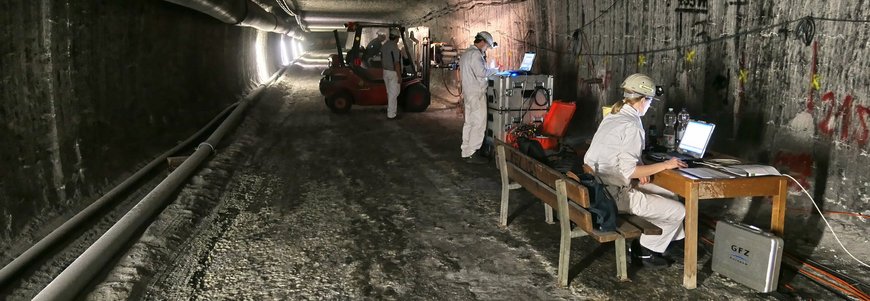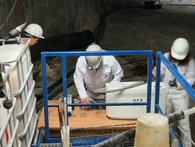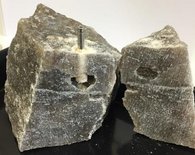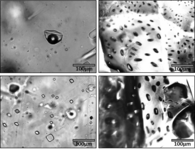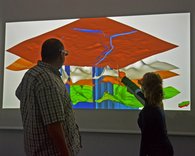ProSalz - process understanding, scalability and transferability of reactive multiphase transport in salt deposits
Description:
Salt deposits in Germany have not only a large economic significance as resource, but are of increasing interest as energy storage space. Due to the impermeability of the salt rock, the storage of various energy-rich fluids in technical caverns is possible. This secures a stable energy supply in the course of fluctuating availabilities from renewables. General concepts for examination and monitoring approaches are needed to ensure the long-term integrity and safety of the caverns during their operation and abandonment. This requires a detailed process understanding of the multiphase system salt-gas-water in the transition zone between cavity and solid rock.
Therefore the project ProSalt addresses questions of temporal and spatial dimensions of fluid migration in cavernous salt structures. It is funded by the BMBF as part of the program "Geo Research for Sustainability (Geo: N)". Due to the construction of a storage cavern, the contact area fluid-salt rock is not directly accessible which makes investigations difficult. For this reason, comparable structures in an underground salt mine will serve as a perfect analogue which makes in situ observations of multiphase processes possible. Here, naturally migrating fluids create cavernous structures.
Extensive geochemical and geophysical measurements at different dimensions are planned. A natural cavernous structure will be examined along different profiles in the underground mining setting. Furthermore, an artificial cavity will be created in a salt pillar in order to simulate and observe cavern-like processes under in situ conditions. Similar investigations are planned at the laboratory scale - from large-scale experiments in a 400 L pressure vessel (LARS) to the microscopic range - the influence of salt mineralogy, moisture content, gas composition as well as temperature and pressure gradients on the fluid migration behavior will be investigated.
The comparative studies on different scales are used to evaluate the transferability of results. Based on this, numerical simulations, process-based modeling approaches that are applicable to natural and artificial systems will be derived for quantification. The resulting data are of interest for research and industry. For the development of new technologies for energy storage in the course of the exit from nuclear and fossil-fuel energy, reliable forecasts from construction, through the operation to the final storage of salt caverns are crucial. In potash and salt mining, the exploration methods and prognoses of possible fluid infiltration and the associated propagation of salt solution can be improved by better process understanding. Mining activities will therefore become safer and more effective.
New session at the EGU 2019 - Salt deposits as reservoir and storage space: research and development in subsurface and solution mining activities
TP1 experiments underground
Examination of the transition zone of a natural cavernous structure
- Drill core and fluid sampling at defined intervals
- Seismic monitoring and ground radar measurements
- Long-term geochemical monitoring of fluid release
Process-oriented experiments on a field test cavern
- Generation of a cavern equivalent in a pillar
- Experimental simulation of cavern-like processes and monitoring
- process monitoring using a seismic sensor network and ground radar measurements and geochemical measurement points around the pillar
TP2 laboratory studies
Geochemical analysis of the samples of the transect (TP1) and the experimental simulations (TP2)
- Fluid and rock analysis as well as determination of model ages
- Analysis of stable isotopes of water and CO2
- Microscopic examination of mineral composition, fluid inclusions and micro fractures
Process-oriented experimental simulation of cavern-typical multiphase processes on different scales
- X-ray measurements of mineral changes in a humidity chamber
- Experimental simulations in a flow cell
- Experiments in the LArge Reservoir Simulator (LARS)
TP3 Fluid system modeling and data management
- Establishing of models and base scenarios on all scales
- Contribution to the experiment concept by prior numerical process simulations
- Sensitivity analyzes in the parameter space of geochemistry and hydromechanics
- Development of scale-dependent reaction modules
- Calibration of the reaction modules with laboratory and field data
- Scenario analyzes of caverns
Publications
Strauch,B., Abdel Haq, C., Barth, L., Giese, R., Krüger, K., Kühn, M., Lohr, S., Myrttinen, A., Richter, H., Steding, S., Zimmer, M., Zirkler, A., Process understanding, scalability and transferability of fluid-rock interactions in salt deposits.Geophysical Research Abstracts, General Assembly European Geosciences Union (Vienna, Austria 2018), p. 10314
Strauch, B., Zimmer, M., Zirkler, A., Höntzsch, S., and Schleicher, A. M.: The influence of gas and humidity on the mineralogy of various salt compositions – implications for natural and technical caverns, Adv. Geosci., 45, 227-233, https://doi.org/10.5194/adgeo-45-227-2018, 2018
Strauch, B., Zirkler, A., Myrttinen, A.: Das Forschungsprojekt ProSalz: Prozessverständnis, Skalierbarkeit und Übertragbarkeit von reaktivem Mehrphasentransport in Salzlagerstätten, Kali &SteinSalz 02/18, 18-29, ISSN 1614-1210 https://www.vks-kalisalz.de/fileadmin/user_upload/vks_kalisalz/downloads/Zeitschriften/2018-2-Kali-Stein.pdf
Project details
Duration of project: 2017 - 2020
Funding: BMBF Programm Geo:N - geoscience for sustainability
Cooperation partner:
⇒ GFZ
- Sec. 3.1 - Dr. Bettina Strauch (project coordinatior), Dr. Martin Zimmer
- Sec. 6.4 - Dr. Rüdiger Giese, Dipl.-Geophys. Heike Richter
- Sec. 3.4 - M.Sc. Svenja Steding, Prof. Dr. Michael Kühn
⇒ Friedrich-Alexander-Universität Erlangen-Nürnberg (Prof. Johannes Barth, Dr. Julia Arndt)
⇒ K + S Aktiengesellschaft (Axel Zirkler, Dr. Anssi Myrtinnen)
⇒ Untergrundspeicher- Geotechnologie-Systeme GmbH (Claudia Abdel Haq)


